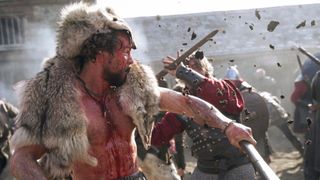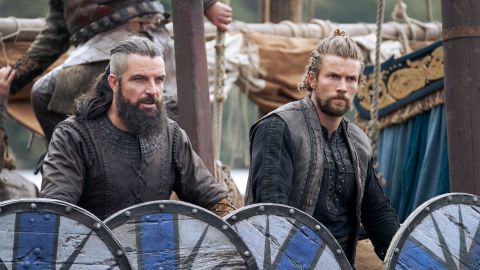Vikings: Valhalla does not waste time. The Netflix spin-off invades, pillages, wages war, and crowns kings – all within its first few episodes. It’s little wonder, then, that the event that kicks off the series feels like an afterthought.
Set over a century after the original History Channel series, Valhalla sees the Vikings in a precarious position after the St. Brice’s Day Massacre, an event that centres on England’s King Aethelred removing the Viking presence from his shores in an act of genocide.
At this point, the show’s charming cast of characters are introduced and things start to temporarily (and mercifully) settle down. King Canute (Bradley Freegard) leads his Danish fleet to England alongside a composite of Viking forces. Chief among them is the brash, cocky young Norwegian prince Harald (Leo Suter) and his half-brother Olaf (Johannes Johanneson), a boorish, untrustworthy figure who thinks only of which throne he’s best suited to sitting on.
The two main characters, though, are wisely positioned as newcomers and outsiders. Viewers setting sail with the Vikings franchise for the first time will instantly connect to Greelander siblings Leif (Sam Corlett) and Freydis (Frida Gustavsson), the children of legendary warrior Erik the Red.
It’s Leif’s journey that proves the most compelling. The central conflict of the show is between the Viking factions and religion: on one side, the burgeoning Christian faith that has spread throughout Denmark and Norway. On the other, the Greenlanders’ ‘pagan’ beliefs in following the Allfather. Throughout Vikings: Valhalla, Leif is torn between both the new ways and the old ways.
Where Leif’s inner turmoil provides some of the most intriguing character explorations, Freydis’ pilgrimage to holy site Uppsala (via the familiar Vikings locale of Kattegat) on a quest for revenge is altogether more straightforward and one-note. It’s all in service of setting up a hero’s journey that is far too familiar.
A new Leif
Each of the sibling’s stories, however, do share in some of Vikings: Valhalla’s biggest hooks on different sides of the continent: the world-building and action. It’s rare to see a show (admittedly, backed by a previous series) arrive with such a swaggering confidence. Everyone knows their place on the board from the outset, and it mostly involves them swinging swords and shields at each other.
Vikings fans will be familiar with Valhalla’s visceral intensity, and it’s in the fight scenes and action sequences where the show truly shines. The slightly too clean choreography may not mesh as well with the handheld style of direction, but the battles are always entertaining.
The rushing onslaught of bodies and guttural growls also slide in neatly alongside the show’s mantra of never shying away from meaningful stakes. Punches are not pulled and plot armor is nonexistent. Big characters can (and do) meet the pointy end of a sword or a hangman’s noose. These brutal, furious jolts of energy often bring various conflicts to a head in devastating fashion, even if the best ones come a little too soon in Vikings: Valhalla.
Yet, it’s not all about Vikings. The entrenched English court in London is where much of the heavy plotting and intrigue lay.
Godwin, the opportunistic right-hand man to the king, oversees a changing dynamic in London, all while having to contend with bratty king-in-waiting, Edmund, played by Louis Davison who brings shades of Games of Thrones’ Joffrey to the role, but lacks the required nuance in his big scenes. Edmund’s stepmother Emma of Normandy (Laura Berlin) and Queen Aelfigu (Pollyanna McIntosh) also add a regal touch and further muddy the political waters to good effect.
Godwin’s scenes are what Vikings: Valhalla strives to be away from the battlefield but, the Earl aside, never really consistently hits the mark with any real conviction. His pursuit of power (and staying in power) improves even the most dramatic of moments thanks to his propensity for backstabbing and betrayal. David Oakes’ performance gifts the viewer with just enough juicy double meaning so that we can see whirring gears start to turn in his head, all while his captive court remains oblivious. In that sense, it mirrors some of Game of Thrones’ best-laid plans, but those moments are few and far between.
When worlds collide

The show does hit its stride in both realms when the worlds of the Vikings and the English collide. Oddly, they almost all arrive, as is a frustrating running theme with the series, very early on. The latter half of the eight-episode run is far more distracted with the Christian zealot Kåre (Asbjørn Krogh Nissen), who delivers an imposing force-of-nature performance that works tremendously well as the season’s overarching villain but often feels like a second season plot intruding on its first.
It’s no exaggeration to say that Vikings: Valhalla hits fast-forward through multiple seasons’ worth of material in just a few episodes. Relationships are rattled through, tensions rise and fall, and monarchs rush across continents, all in mere minutes. As such, you can never really buy into some of the core dynamics thanks to their rickety and rushed foundations, and the second half of the season fizzles out because the big dramatic beats don’t always land.
Slightly more glacial pacing would have worked wonders for the series. In a show dotted with a handful of complex, rich characters, it’s clear that they deserved a larger, broader canvas on which to paint.
Vikings: Valhalla isn’t one for fan theories and beat-by-beat breakdowns. It’s a breakneck rollercoaster; a big, grimy axe swing of a series that will appeal to many but will put off those craving more minutiae in its characters and drum-tight plotting in its story. Ultimately, it burns bright and flickers out towards the end of the first season – but not without first delivering a lean, sinewy historical series that aspires to one day be an epic. With a little more finetuning, Vikings: Valhalla could join the pantheon of great Netflix series in the years to come. Skol!
Vikings: Valhalla is available on Netflix from February 25. While you wait, check out the best Netflix shows available on the streamer.


